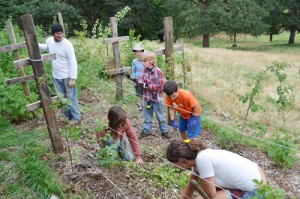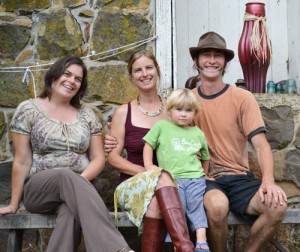The seemingly never-ending paperwork to complete for grants, a conditional use permit, policies and other projects didn’t cause her to hesitate. She wasn’t deterred by the need to raise money or the amount of work needed to be done on the farm.
Kate Lincoln was 100 percent sure becoming the executive director at GeerCrest Farm was the right choice for her, so much so she and her husband, Russell Slatton, moved from Portland to Silverton this spring with their children, Azure, 4 and Elan, 2.
“When I first saw the farm, it was love at first sight,” Lincoln said. “What we have at GeerCrest Farm is astonishing to me and I am proud of it. The fact the farm exists all these years as a working farm is a gem in our world.”
Receiving her bachelor’s degree at Michigan Technological University and master’s degree at University of Nebraska, Lincoln has been a Peace Corp volunteer, worked at the Oregon Department of Forestry and as a research specialist on a Community Supported Agriculture Farm ran by the University of Virgin Islands on the Virgin Islands. Her background has prepared her to serve as GeerCrest’s executive director because she knows how to work with the resources she has while reaching out to form partnerships, she said.
Add to that her belief in agrarian culture and that more and more people want to know where their food comes from – all provide Lincoln the inspiration she needs to help the farm move forward to achieve its goals.
Established as a homestead in 1848 by Ralph and Mary Geer, GeerCrest Farm is the second land claim awarded in Oregon. The farmhouse was completed in 1851.
Lincoln’s role is to build on the foundation created in 2007 by the late Vesper Geer and Jim and Erika Toler, who are the fifth generation of the family to live and work at the farm that has two buildings on the National Register of Historic Places and an Oregon Heritage tree.
Realizing they are the “probable last generation of family stewards of GeerCrest,” the Tolers are “focused on preserving this cultural resource for future generations. They wish to preserve and pass on something else. In our rush to embrace a better future, we have lost something of our past, and that is, our connectedness to the land, the soil, the source of our food and a lifestyle we call agrarian culture,” reads a passage from the GeerCrest Farm and Historical Society’s website.
The farm, as Lincoln sees it, is a vessel containing the past, present and future.
Every day, she learns something new about the men and women who lived and worked on the farm and wants to share their stories.
She’s excited about farm’s future from using biodynamic farming methods to solar panels and wants it to be a place where people can come and learn about agrarian culture.
Through the stories shared by Jim and Erika Toler, she has learned its history as a gathering place for people to discuss ideas, share meals or celebrate life through music.
She wants that legacy to continue.
One of her goals is to make a connection between Silverton residents and the farm. She has joined the Silverton Chamber of Commerce and partnered with the Silverton Historical Society. She’s planning events at First Fridays and encouraging school children to visit or volunteer at the farm.
“I want GeerCrest to be Silverton’s farm and I want people to be proud of the farm’s history and proud of its future,” she said. “There are many great opportunities for people to come to farm and learn.
“We have more ideas than time and money,” Lincoln said.
She said she is grateful for the Tolers, who provide their guidance and vision; and Kya and Hayden Eckstrand-White, who are the working generation of GeerCrest. Kya is the farm life and education director and Hayden is the farm manager. She appreciates the work done by the farm’s board of directors, volunteers and the farmers who share her love for the historic farm.
Mention GeerCrest Farm and most people think of Homer Davenport, a famed political cartoonist for the Hearst papers. Davenport spent much of his childhood on the farm, then home to his maternal grandparents. His autobiography, The Country Boy, recounts several of his visits to the farm from the Davenport family home in Silverton.
He drew a cartoon and wrote the following words on an outside farmhouse wall on April 11, 1904, “I want to say that from this old porch I see my favorite view of all the earth affords. It was the favorite of my dear mother and her parents and my father and why shouldn’t it be the same to me. It’s where my happiest hours been spent.”
Homer may be the most famous, Lincoln said, but he’s not the only Geer to go on to do great things. The farm was home to LB Geer, state commissioner of lands in 1900; Pearl Geer, the former president of the Oregon State Secular Union, co-founder of the Liberal University and an actor of stage and film; Theodore Thurston Geer, first native-born governor who introduced Oregon’s first bike bill and who rode his bike to work; Musa Geer, the first woman to climb Mount Jefferson, who traveled to New York to work as a Lord and Taylor model, became a dress designer and worked at Hearst newspapers and Vesper Geer, who was charged with the responsibility by her father, Arch, to keep the farm in the family. Vesper helped start GeerCrest Farms as a nonprofit historical society.
“There is an energy that exists on the farm that motivates people to do their best,” Lincoln said.
Thanks to Musa Geer, the farm has an archival collection of letters and documents dating back to the 1870s that richly paint a picture of her life and the life of her family.
It’s Vesper Geer who Lincoln draws her inspiration from. Although she never met Vesper, Lincoln shares her dedication and responsibility of preserving the farm by working with her staff and volunteers to create a place for people of all ages and backgrounds to learn about agrarian culture.
 There are opportunities for people to stay in the historic farmhouse while visiting nearby sites and sharing meals. There are education opportunities that includes field trips, overnight stays and a farm life experience program. Guests can come for a farm dinner, with food from the farm. There are also workshops and retreats.
There are opportunities for people to stay in the historic farmhouse while visiting nearby sites and sharing meals. There are education opportunities that includes field trips, overnight stays and a farm life experience program. Guests can come for a farm dinner, with food from the farm. There are also workshops and retreats.
A sign above Lincoln’s desk reads, “It is our mission at GeerCrest Farm to live and teach the agrarian life.” And to share why she and many others who venture to the farm to work or live have fallen in love with its poetic beauty that blends a past, present and future, she said.
“We are open to ideas and innovations and what others have to teach. We don’t have all the answers but we welcome all who want to learn,” she said. She believes people can draw what they learned from working or visiting the farm and use the knowledge to achieve their own goals. Lincoln hopes Ralph and Mary Geer would be proud of the work done today at the farm.
GeerCrest is a “house of pioneers” from Ralph and Mary Geer to Erika and Jim Toler, she said. “We will continue to think of new and innovative ways that expand what is here while preserving the past.”
